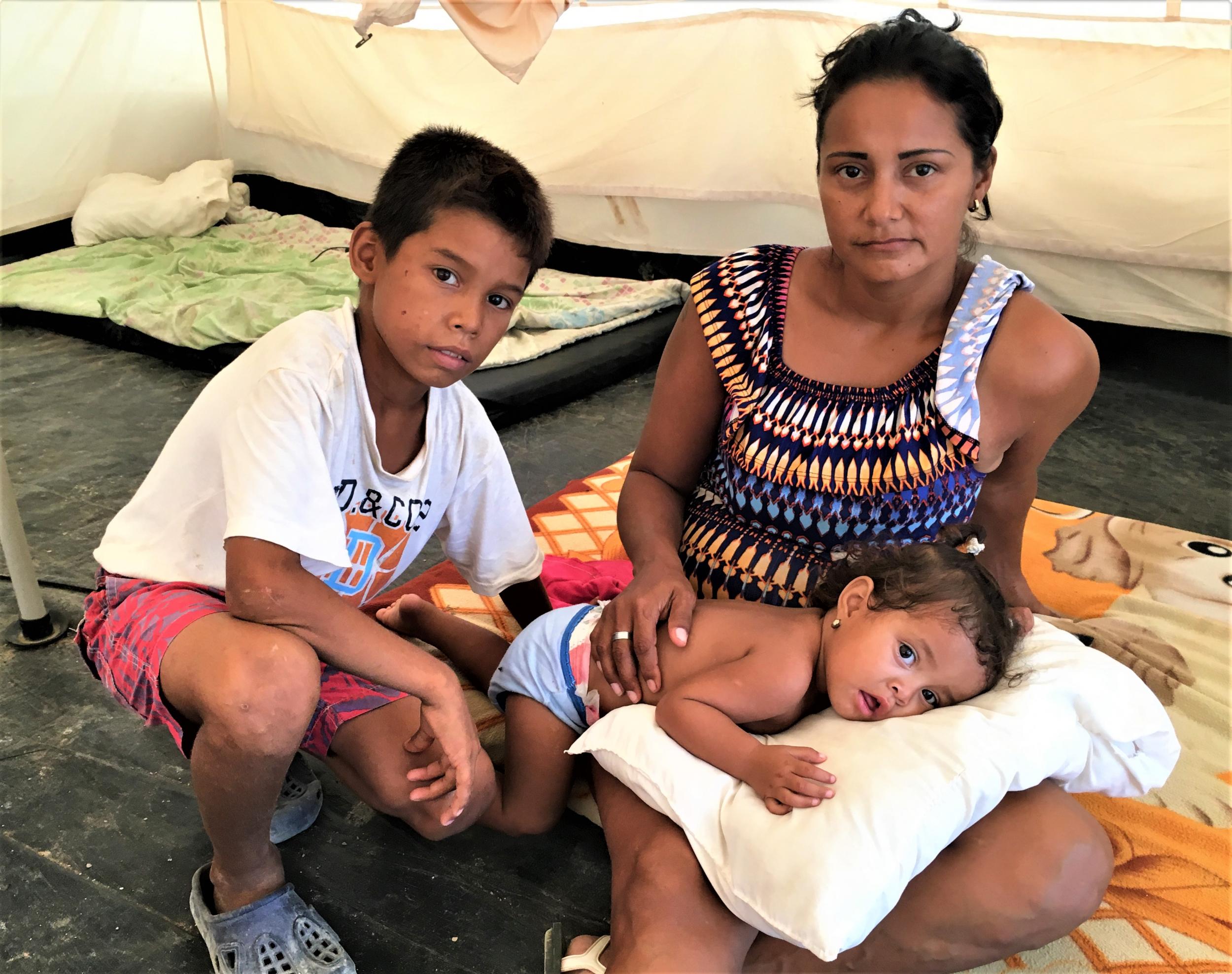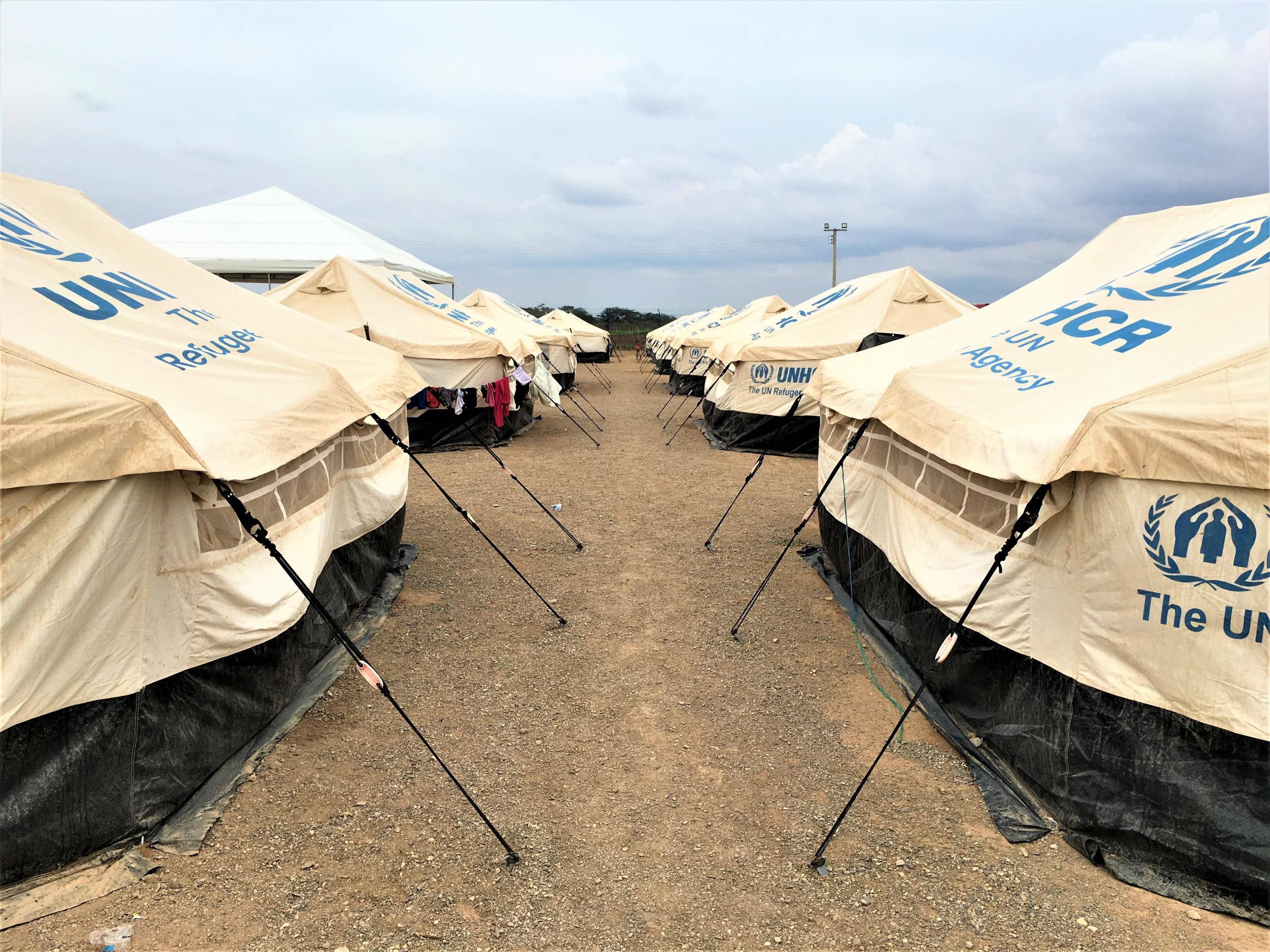'They rape you, they rob you': Venezuelan refugees fleeing destitution face new dangers across the border
Those arriving in Colombia are often forced to sleep on the street, leaving them vulnerable to armed gangs, as Naomi Larsson reports


Ruely Adriana Gonzalez sits on a thin mattress as her three children lie slumped beside her in the tent, dozing in the afternoon heat.
Outside, kids fly handmade kites between the rows of white tents here in the Colombian desert, a dry plain scattered with green bushes and cacti.
At 37 years of age, Gonzalez has a youthful smile, but her face bears the strain of the long journey to get to this camp in Maicao, a city close to the Venezuelan border, the place she will call home for the next month.
Gonzalez is one of the millions of Venezuelans who have fled violence, hyperinflation and extreme food and medical shortages in the country.
A former cleaner in the coastal city of Maracaibo, she held out as long as she could. Without a job and unable to buy food, Gonzalez sold ice in the streets until she made enough money for bus tickets to Colombia.
With no connections here, no money and no possessions – just extra clothes for her children – Gonzalez knew coming to Maicao would mean sleeping on the streets until a place in the overcrowded camp became available.
“I knew I had to sleep on the streets here,” she tells The Independent. “It was very hard. I thought a lot about this decision, but I told myself either I do it now or I’ll never do it.” Looking at her children, aged 11, four and two, who lie calmly beside her, she adds: “I had to do it because of them.
“It was terrible, but it was better than being in Venezuela, because there is nothing there.”
Gonzalez and her children spent eight days on the streets. They slept on cardboard outside a supermarket – although she couldn’t sleep. “I was looking at the girls, I couldn’t sleep well, just waiting until I managed to come here,” she says.
They were eventually given a spot at a camp run by the United Nations’ Refugee Agency (UNHCR). For the next four weeks, she and her children will have shelter, security, and access to food and healthcare.
The Integrated Assistance Centre, which opened in March, is the first of its kind in Colombia. With more than 1,500 Venezuelans sleeping on the streets of Maicao, a historically poor city with already strained resources, the local government felt forced to enlist the help of the UNHCR.
People are arriving with no cash, just to settle for the first days and being forced to sleep on the streets, which makes them more vulnerable
It signals a worrying decline for Venezuelans. An estimated 5,000 people continue to cross the border each day. New figures from the United Nations claim that 3.4 million Venezuelans have left the country since 2015, a figure predicted to rise to 5 million by the end of 2019, making it one of the biggest displacement crises in the world.
Ongoing hyperinflation and recurring blackouts across Venezuela have left people without electricity, water, and unable to withdraw cash from the bank.
Officials say the citizens with the fewest resources are the ones now crossing the border.
“We are seeing more and more vulnerable Venezuelans are arriving,” says Olga Sarrado, UNHCR communications officer. “Around 2018 we saw more single males who had cash with them, so the risks were fewer. Now we see more families, elderly, single women, children.
“People are arriving with no cash, just to settle for the first days and being forced to sleep on the streets, which makes them more vulnerable.”
Maicao sits in the impoverished region of La Guajira, where trafficking networks are known to operate. Closures of formal border points mean migrants have been forced to use dangerous irregular crossings, where they are at the mercy of traffickers and at risk of sexual exploitation or kidnapping.
I’m looking for work, but I don’t know how, I don’t have contacts here
Katty del Valle Marquez, a 41-year-old single mother, came to the Maicao with her daughter after paying traffickers to get through an irregular border crossing.
“I knew I was going to have to sleep on the streets when I came here, but there was no other option,” says Marquez, now in the camp after a week of sleeping rough.
“I’ve heard stories of [traffickers] raping girls. They rape you, they rob you. A cousin and friend did this journey, and [the traffickers] took everything, they even took their clothes. They had to get bin bags, and arrived to Maicao just wearing the bags,” she says.
“My friend started crying [when she told me] and said, ‘I thought they were going to rape me.’”
UNHCR’s Sarrado says Venezuelan migrants are facing serious dangers across the border. “In Colombia, there is a risk that Venezuelans who are sleeping on the streets could be recruited by armed groups,” she says. “And for both adults and children, there is a risk of women having no other option than engaging in survival sex because there is no other way of getting money. They arrive without cash.”
The UN camp hopes to provide some protection, albeit temporary.

It’s been likened to a refugee camp, but officials are clear of its differences: the centre takes in only the most vulnerable people, and they can stay for just one month.
Migrants in Maicao must sign up on Tuesdays or Thursdays to be assessed for a place at the centre. It has a capacity of 350 across 60 tents, and so far 800 people have been through its canvas walls. They have a waiting list of over 1,000.
These four weeks are meant to give Venezuelans time to make contacts, find work, or a place to live. The UN supports their travel outside of Maicao, and has partnered with NGOs to provide cash handouts for three months after they leave the centre.
I knew I was going to have to sleep on the streets when I came here, but there was no other option
“It’s relatively easy to get people in and more difficult to get people out without returning to the situation they were in before,” says Federico Sersale, head of the UNHCR office in Riohacha, Colombia. “We’re working closely with the government on the exit strategy.”
While there’s a serious fear of ending up back on the streets, no one has returned to the centre. “Not yet at least,” he says.
But for some, a month does not seem long enough.
Gonzalez’s eyes fill with tears when she tells The Independent she doesn’t yet have a plan once her time at the centre is up.
“I don’t know what I’ll do,” she says. “Before I arrived, I heard it was for three months, but when I arrived they said one month and I was so scared. For me a month is not enough. I’m looking for work, but I don’t know how, I don’t have contacts here.”
“To go back to the streets,” she says, “it will be terrible, especially for the girls.”
Join our commenting forum
Join thought-provoking conversations, follow other Independent readers and see their replies
Comments